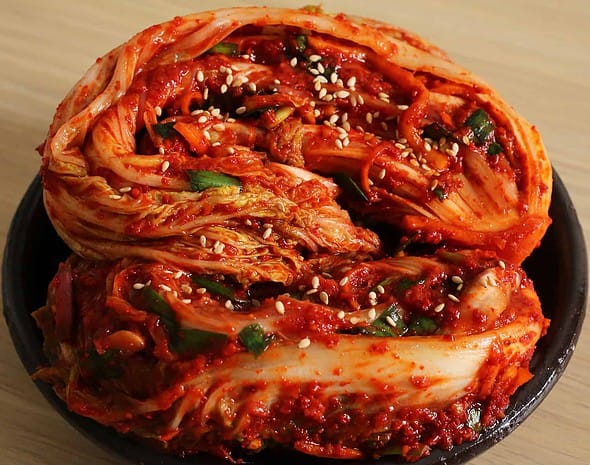Kimchi-making becomes intangible heritage in South Korea

Kimchi-making, one of the major food cultures of Korea, has been designated as an intangible cultural property.
The Cultural Heritage Administration (CHA) announced Wednesday it had designated kimchi-making as Intangible Cultural Heritage No. 133, after it received preliminary notice in September.
The concept of kimchi-making is broader than “gimjang,” or making and sharing kimchi in Korean, which was inscribed in UNESCO’s Representative List of the Intangible Cultural Heritage of Humanity in 2013, along with the tradition in North Korea.
Kimchi-making encompasses the general culture around the fermented dish and regionally specific variants of kimchi.
Kimchi is an inextricable part of Korean cuisine. It is a side dish made from vegetables seasoned and fermented with various condiments such as red pepper powder, garlic and “jeotgal” (salted seafood).
It has been a staple on Korean dining tables, with origins dating back to the early period of the Three Kingdoms (37 B.C.-7 A.D.). Historically, kimchi has evolved to feature various local ingredients. As seen in early records, kimchi did not originally use garlic or chilli pepper. Chilli pepper is now a common ingredient of the vegetable dish, but it was introduced to Korea in the early 17th century by Portuguese traders.
The CHA said kimchi-making encompasses the sense of community and fellowship such as cooperation and harmony and includes traditional knowledge.
“The tradition also has been passed down through the generations, still exists and many Koreans take part in kimchi-making routinely, so we decided kimchi-making is recognisable as an intangible cultural heritage,” the CHA said.
When gimjang made the UNESCO list, the collective practice was credited for reaffirming “Korean identity and is an excellent opportunity for strengthening family cooperation” and “also an important reminder for many Koreans that human communities need to live in harmony with nature.”
However, the CHA said kimchi-making is more of a lifestyle and does not require a high degree of skills, so they will not acknowledge specific holders or organisations of the intangible heritage.
“We will research and document to discover the cultural value of kimchi-making,” the CHA said.
Article Source: http://www.scmp.com/news/asia/east-asia/article/2120194/kimchi-making-becomes-intangible-heritage-south-korea
Image Source: https://www.maangchi.com/wp-content/uploads/2014/06/whole-cabbage-kimchi-590x466.jpg
VOCABULARY WORDS:
1. Intangible (adj.) ~ unable to be touched or grasped not having physical presence
2. Variant (n.) ~ a form or version of something that differs in some respect from other forms of the same thing or from a standard
3. Inextricable (adj.) ~ impossible to disentangle or separate
4. Encompass (v.) ~ surround and have or hold within
5. Reaffirm (v.) ~ confirm the validity or correctness of (something previously established)
6. Credit (v.) ~ publicly acknowledge someone as a participant in the production of (something published or broadcast)
QUESTIONS FOR DISCUSSION:
1. Is kimjang still a common practice in Korea these days? What is the importance of this tradition?
2. How do you feel about this recognition from UNESCO?
3. What is your opinion on the rising popularity of kimchi around the world?
4. What are the cultural values of kimchi and kimchi-making?